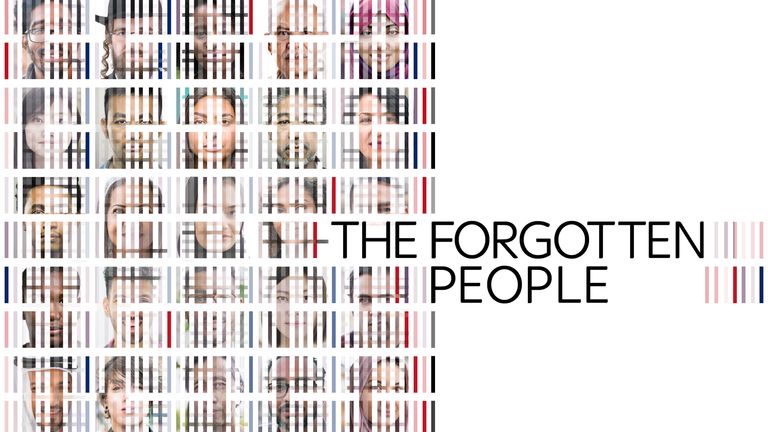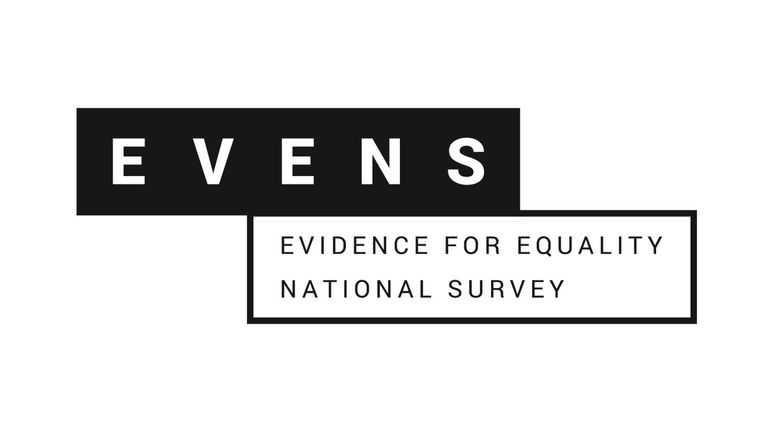How do we know if life for people from ethnically diverse backgrounds is getting better?
The biggest project of its kind aims to fill the gaps in statistics on ethnicity such as small and unrepresentative samples.
Tuesday 6 July 2021 13:29, UK
George Floyd’s death sparked conversations all over the country about race and inequality – amongst friends, in homes, in the workplace and in government.
Acknowledgements, promises and pledges followed. Organisations signed up to do better, to talk to people from different backgrounds and address their problems and concerns.
A year later, is life any better for the UK's Black and ethnically diverse communities?
Sky News set out to try to answer this question and we discovered an astonishing truth - one which may also show the ways some groups are marginalised by established practices.
There is a huge gap in the data, in the information we have about the many diverse groups of people in this country. From Black and Asian people to Gypsy, Roma, Traveller and Jewish communities, some experts argue this gap in the data leads to poor policy decisions.
Mental Health
The COVID crisis has shown us just how much of an impact an event or set of circumstances can have on a person's mental health.
But there is no single study which analyses mental health and the outcomes for people from marginalised ethnic groups.
This greatly concerns Professor James Nazroo who is a professor of sociology at the University of Manchester and a member of the Centre on the Dynamics of Ethnicity (CoDE). After qualifying as a doctor, he specialised in medical sociology and he has been studying health inequalities since the late 1980s.
He says: "Current studies do not look into how people live, how they are treated by medical professionals or their experience of racism, all of which could have an effect on a person's mental health."
Professor Nazroo brought together a number of different studies to conclude that for every White person with a diagnosis of a serious mental disorder, such as schizophrenia, the number of Black people receiving the same diagnosis is more than five times higher.
Part of this conclusion draws on NHS data which count the number of people admitted to mental health wards by ethnicity. But this measurement was stopped 10 years ago.
Professor Nazroo says: "Not only did the collection of these crucially important data stop, the surveys that we use to measure the health and mental health of the population have also stopped focusing on ethnic differences.
"This means that the mental health outcomes of ethnic minorities are not being measured fully at the moment and it is impossible to find out why there is this greater risk of severe mental illness among black people."
Health and vaccination
A lack of high-quality data broken down by ethnicity could also be making the fight against COVID-19 harder, according to professor Nazroo.
Using multiple sources, he has found that around 20% of people aged 80-89 who identify as White British say they have poor health.
This is the same proportion of 50-59-year-olds of Bangladeshi heritage reporting poor health. Meanwhile Black Caribbean people aged 70-79, a full decade younger than white people, report the same level of poor health.
But there is no single study collecting data on the health and associated circumstances of older people from ethnic backgrounds.
If there were, professor Nazroo argues that policy makers could have prioritised the COVID vaccination programme for the ethnic groups most at risk, or by the locations where people from those groups are more likely to live.
He says: "We know some Asian communities report serious health problems at a younger age than White people, which reflects earlier biological ageing as a result of the accumulation of disadvantage. This means different groups of people should have been prioritised for vaccination against COVID at different ages.
"The programme could also have targeted ethnic minority communities in different areas at different times. But the Joint Committee on Vaccination doesn't have easy access to the detailed data necessary to support such a decision."
Rural life
More than a quarter of a million people from marginalised ethnic backgrounds in England live in rural communities - that's the same number of people who live in Derby or Salford - but most surveys and research are carried out in cities.
Professor Nazroo says: "Surveys generally only use samples from urban areas with high proportions of ethnic minority residents, because it is argued that it is too expensive to sample from other areas. This is why research does not cover ethnic minority people living in more rural areas, or indeed those ethnic minority groups that are small in size, even though they may face large inequalities."
These inequalities can be much larger than in urban areas. For instance, Sky News Home Editor Jason Farrell spoke to Black people in Somerset about what it's like to live in a rural community.
Chef Waheed Seria explained he'd been stopped and searched by police at least 12 times since living in the area. And his experience is not uncommon.
In Somerset, Black people are eight times more likely to be stopped by police than White people, compared with four times more likely in London. In neighbouring Dorset, this difference increases to 23 times more likely.
And while rates of stop and search across the country have been coming down, that disparity persists.
But no one is investigating why?
Patrick Williams from CoDE says: "We know that the patterns of offending behaviour are broadly similar for all ethnic groups. However, there is still a sense that people from ethnic minorities who live in rural communities are seen as outsiders and therefore viewed with suspicion."
Dr Nissa Finney is an expert in human geography at the University of St Andrews. She is also leading a major new research project at CoDE.
She says: "There is plenty of research presented about people from ethnic minority backgrounds in the UK. But any policy is reliant on the evidence that informs it.
"It's very likely that policies will be misplaced and ineffective if they are based on evidence from studies using very small samples sizes, which are taken from a single location or cover one narrow aspect of life."
The new study, that she and other academics from the Universities of Manchester, St Andrews and Sussex, aims to rectify some of these data problems to better inform policy making.
It is called the Evidence on Equality National Survey (EVENS) and is collecting information on a wide range of issues faced by ethnic and religious minority people.
It hopes to gather the experiences of up to 20,000 people across the country in the biggest ever study of its kind. It will break down the data to show the challenges faced by numerous different groups.
It aims to plug the data gap in areas like health, employment, criminal justice, racism and discrimination, where robust evidence does not exist.
Dr Finney says: "The Government's levelling-up agenda is an example of where this study could help. It's great to see a policy focus on inequality but current initiatives are being aimed at inequality of opportunity such as in education and training.
"If we don't know about issues around people accessing those opportunities and their experiences when they do, including racism or poor mental health, we won't see that levelling up."
The EVENS project is collecting information from ethnic and religious minority people until the end of June 2021. Sky News will be following its progress and reporting on what it uncovers about the lives of the marginalised people missing from the data in the UK.
Ethnic and religious minority people can take part in the survey online bit.ly/evensurvey or via telephone using a freephone number: 0808 129 6800, and you can find out more at www.evensurvey.co.uk.
The Data and Forensics team is a multi-skilled unit dedicated to providing transparent journalism from Sky News. We gather, analyse and visualise data to tell data-driven stories. We combine traditional reporting skills with advanced analysis of satellite images, social media and other open source information. Through multimedia storytelling we aim to better explain the world while also showing how our journalism is done.

